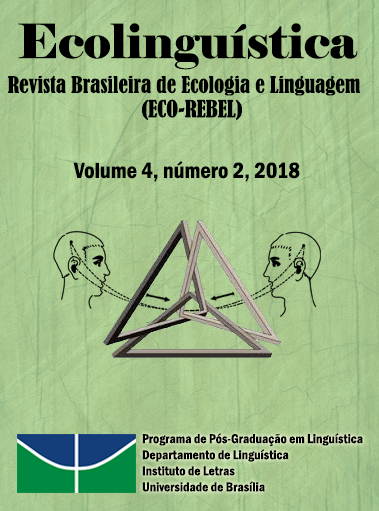Alwin Frank Fill
Abstract
Alwin Frank Fill is Professor Emeritus of English at Graz University (Austria). He studied English and Latin at the University of Innsbruck and undertook further studies at Queen's College (University of Oxford, UK) and at the University of Michigan (Ann Arbor, USA). His main research interests are ecolinguistics, language and suspense, the impact of language and linguistics for kids. He has published books on all these topics, most recently The language impact: evolution, system, discourse (2010) and Kinder- und Jugendlinguistik (2014). His books on ecolinguistics include The ecolinguistics reader (ed. with P. Mühlhäusler, 2001) and Sustaining language: Essays in Applied Ecolinguistics (ed. with Hermine Penz, 2007). Einar Haugen is justly considered the "father" of ecolinguistics, but he who kicked off its spread all over the world was Alwin Fill. In regard to Brazilian Ecolinguistics, he sent some Introductory Words to be read at the I EBE (1st Brazilian Meeting on Ecolinguistics, University of Brasília, 2012), which were published with a selection of teh papers presented in Cadernos de linguagem e sociedade v. 13, n. 1, 2013, available in paper and at http://periodicos.unb.br/index.php/les/issue/view/833
Downloads
Downloads
Published
How to Cite
Issue
Section
License
Authors who publish in this journal agree to the following terms:
Authors retain copyright and grant the journal the right of first publication. The work is simultaneously licensed under the Creative Commons Attribution License allowing the sharing of the work with acknowledgment of the authorship of the work and initial publication in this journal.
Authors are authorized to enter into additional contracts separately for non-exclusive distribution of the version of the work published in this journal (e.g., publishing in institutional repositories or as book chapters), with acknowledgment of authorship and initial publication in this journal.
Authors are allowed and encouraged to post and distribute their work online (e.g., in institutional repositories or on their personal page) at any point before or during the editorial process, as this can bring about productive revisions as well as increase impact.
Citation of published works (See The Effect of Free Access).



3.png)



